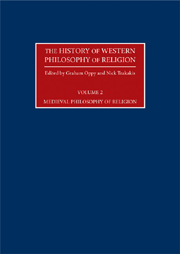Book contents
- Frontmatter
- Contents
- Editorial Introduction
- Contributors
- 1 Medieval Philosophy of Religion: An Introduction
- 2 Boethius
- 3 Johannes Scottus Eriugena
- 4 Al-Farabi
- 5 Avicenna (Ibn Sina)
- 6 Anselm of Canterbury
- 7 Al-Ghazali
- 8 Peter Abelard
- 9 Bernard of Clairvaux
- 10 Averroes (Ibn Rushd)
- 11 Moses Maimonides
- 12 Roger Bacon
- 13 Thomas Aquinas
- 14 John Duns Scotus
- 15 William Ockham
- 16 Gersonides
- 17 John Wyclif
- 18 Nicholas of Cusa
- 19 Erasmus of Rotterdam
- Chronology
- Bibliography
- Index
11 - Moses Maimonides
- Frontmatter
- Contents
- Editorial Introduction
- Contributors
- 1 Medieval Philosophy of Religion: An Introduction
- 2 Boethius
- 3 Johannes Scottus Eriugena
- 4 Al-Farabi
- 5 Avicenna (Ibn Sina)
- 6 Anselm of Canterbury
- 7 Al-Ghazali
- 8 Peter Abelard
- 9 Bernard of Clairvaux
- 10 Averroes (Ibn Rushd)
- 11 Moses Maimonides
- 12 Roger Bacon
- 13 Thomas Aquinas
- 14 John Duns Scotus
- 15 William Ockham
- 16 Gersonides
- 17 John Wyclif
- 18 Nicholas of Cusa
- 19 Erasmus of Rotterdam
- Chronology
- Bibliography
- Index
Summary
Moses Maimonides (1138–1204; known also by the Hebrew acronym ‘Rambam’) is a paradoxical figure in the history of the philosophy of religion. He is thought by many to be the greatest Jewish philosopher who ever lived, yet he did not consider himself to be a philosopher. When he refers to “the philosophers” and “the men of speculation”, he generally intends those who wrote books on philosophy, thus separating himself from them. Born in Cordoba, Spain, Maimonides lived an active life in Egypt as rabbi, judge, communal leader and, in the later years of his life, as a physician in the Ayyûbid court in Cairo. His major work, The Guide of the Perplexed (hereafter Guide; c.1185–90), is widely regarded as a masterpiece in the philosophy of religion, yet its subject matter concerns the fundamentals of the religious Law (shariʿa/Torah), and its primary aim is the explanation of some difficult terms and parables in Scripture. Most of his early writings deal with Jewish law, including the Mishneh Torah (completed 1178–80) and his commentary on the Mishnah (completed 1168–70), the third-century law code that forms the basis of rabbinic Judaism. In the last decade of his life he primarily wrote medical books. Only one purely philosophical work, a short glossary of logical terms, is attributed to Maimonides, and that attribution has recently been questioned (Davidson 2004: 313–22). Nonetheless, his philosophical treatment of the fundamentals of Judaism – he was the first Jewish thinker to draw up a list of such fundamentals – and his largely Aristotelian outlook earned him the designation “the divine philosopher” by the Provencal savant, Samuel ibn Tibbon, who translated the Guide from its original Judaeo- Arabic into Hebrew.
- Type
- Chapter
- Information
- The History of Western Philosophy of Religion , pp. 137 - 150Publisher: Acumen PublishingPrint publication year: 2009

